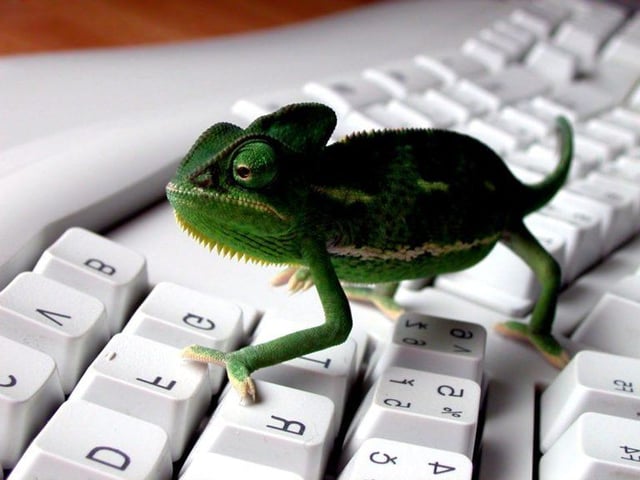
People don’t always understand the profound importance of a given moment when they’re in it. And we can tell because of what they choose to say in that moment. So, for every Neil Armstrong (“That’s one small step for (a) man; one giant leap for mankind.”), we have an Alexander Graham Bell (“Mr. Watson, come here. I want you.”).
That’s definitely the case with computer engineer Ray Tomlinson. As his firm was working on building what would become the internet we know today, he sent the world’s first email. Email: the technology that would span the globe and connect people in ways never-before experienced. Email: the technological breakthrough that would dramatically influence business and eventually undermine presidential campaigns. At the dawn of this new technological era, what was the message Ray Tomlinson chose to communicate on this momentous occasion?
QWERTYUIOP.
And thus was sparked a new communication technology that has increased exponentially in recent years. Email is now ubiquitous. In fact, for many, it has become more than ubiquitous — it has become overwhelming to many of the people we meet in our workshops around the country.
In fact, one of the most common questions we ask attendees in our workshops is, “How many people feel that they get too many emails?” And the vast majority of the hands in the room will shoot up in response. Then we’ll ask, “How many people feel like they don’t get enough emails?” And that question is always met with laughter. Other times, we’ll poll our workshop attendees to see the number of emails they get in a day. And regardless of whether the answer is in the tens or hundreds, when we ask the follow-up question “Would you like to receive more or less email on a daily basis?” the answer is almost always “less.”*
So, the evidence from our workshops is that we’d all love a break from email, but is there a positive case to be made for taking that break from email? And, if there are positive reasons for taking a break from email, how would someone even start that? The answers to those questions are “Yes!” and “let me tell you.” Let’s look at those answers in a little more detail.
How taking breaks from email benefits you and your work
1. You’ll actually be more productive.
Email has a time-efficiency cost to it for a few reasons. First, as my colleague Joe Shaffner wrote in his time-management series, every time you break away from whatever you’re working on (whether it’s some paperwork, a proposal you’re writing, or even another email) your brain takes time and energy to switch mental tasks back and forth. And the more times you check email before completing a task, the greater the productivity drain.
Second, a lot of us are using this communication medium for the wrong types of communication. Email is what we in the communication studies field call a “low immediacy communication platform.” “Communication immediacy” refers all the supporting context clues that tell us how we should communicate with others, and how to understand what’s being communicated to us. For those of you given to people-watching, think about a couple on a first date at a baseball game. Think of all the components that shape their communication. Think of all the environmental sights and sounds, facial expressions, voice inflection, body language, physical distance from one another.
Now think of your average email: you have none of that. There is very little immediate feedback about how you should communicate or how you should understand what the other person is trying to communicate to you. Hence, “low immediacy.” What this means is that, when we communicate via email, we have to expend additional time and energy (from both parties) giving those context clues to each other in order to try increase understanding. The email writer has to write more text than they would have to say otherwise and the reader has to read more carefully since there aren’t supporting context clues to tell them how to interpret the message.**
If we could leave email off while we’re working on tasks, and leverage communication platforms with higher immediacy (Phone, video conferencing, face-to-face), we’d see an increase in productivity.
2. You’ll be happier
There’s a growing body of research showing that the way we tend to use email (with desktop and/or phone notification pop-ups, checking more than 1x/hour) is leading to higher stress and anxiety. For instance, researchers Kostadin Kushlev and Elizabeth Dunn studied the email habits of 124 adults over a two-week period. For the first week, participants were allowed to check email as much as they liked and Kushlev and Dunn measured their reported stress levels and sense of wellbeing. In week two, half of the participants were put onto a schedule where email would only be checked and responded-to at three regular intervals over the course of a day. And at the end of each day, participants were again surveyed to assess their level of stress and sense of wellbeing.
What their research found was that they could reduce an individual's stress and increase their sense of wellbeing simply by limiting the number of times they checked their email in the course of a day. And the effect was not small. Participants on the reduced email schedule reported wellbeing scores comparable to the effect of learning relaxation techniques.
The takeaway? Take breaks from email and be intentional about when you check it and you'll be in a better place psychological and emotionally.
3. You’ll have a greater capacity to do meaningful work
This comes down to vision and agenda. Each of us needs a vision and agenda for our work. Vision and agenda helps us invest in our work. Vision and agenda connects us with our deep purpose and identity for our lives. The problem is that email is (among other things) a conduit for visions and agendas other than our own to be expressed directly to us as we receive the messages. And, in one sense, this is entirely fine. We need to hear from colleagues and direct reports and bosses and family members. However, if we engage with email without a centered grasp on our own agenda and vision for our work, we’ll eventually adopt others’ agendas and visions for our work and lives. And that’s not sustainable in the long-term.
If we could leave email alone for a short time while we establish what our agenda is for the next month or week or day (or even an hour), we’d find ourselves carving out more space (mentally, emotionally, chronologically) for doing work we find truly meaningful.
How to get started taking breaks from email:
- Give yourself permission. Not everyone will need to go through this step. But some of our readers with an overly-strong desire to help or take responsibility for others are going to need to go through a bit of self-coaching around this. Feel free to make yourself a sticky note for your computer or smart phone. You could even place the sticky note over the part of your screen that shows you how many unread messages you have (two birds with one stone there). Remind yourself that those emails will still be there when you choose to check them. Remind yourself that you’ll be a better colleague/boss/friend/etc. for taking a break from email.
- Start small. We talk about this often with habit change. Starting small is important. When we work with clients on taking a break from email, we’ll often start with something like:
- Just for lunch
- Just for the first 10 minutes of your workday
- Just for one hour while you work on _________ (and then pick a meaningful activity or project)
- Just for the evening until you go to bed
- Just for the weekend (this may sound strange, but many people don’t break from email on days off)
- Get your out-of-office reply ready. The out-of-office reply does two things for you. Again, for those of you with an overly-strong desire to take responsibility and help, the out-of-office reply helps you to relax and release the messages and people that you’re not attending to because you’re taking a break. People won’t be going hours or days without hearing from you; your out-of-office message has taken care of that! Secondly — and this is especially true if people in your world aren’t used to you taking time to respond to emails — this gives people the proper expectations for when you’ll be responding to them. They don’t have to wonder if (or when) you’ll respond to them and they can relax and release as well.
What about you? What are your best-practices for taking a break from email? Leave a comment or feel free to drop me a line with any thoughts and I’ll respond right away!
That is, unless I’m currently taking a break from email.
Footnotes:
* We’ll sometimes get people in sales that would like more leads coming to their inbox via their website, but that’s about the only type of email they’d like to see increase.
** This is, in large part, why people have have increasingly used emoticons in text-based communication. It is effectively trying to insert facial expressions into a medium that would not otherwise have them in order to give the other person context clues to know how to interpret what you’re trying to say.




